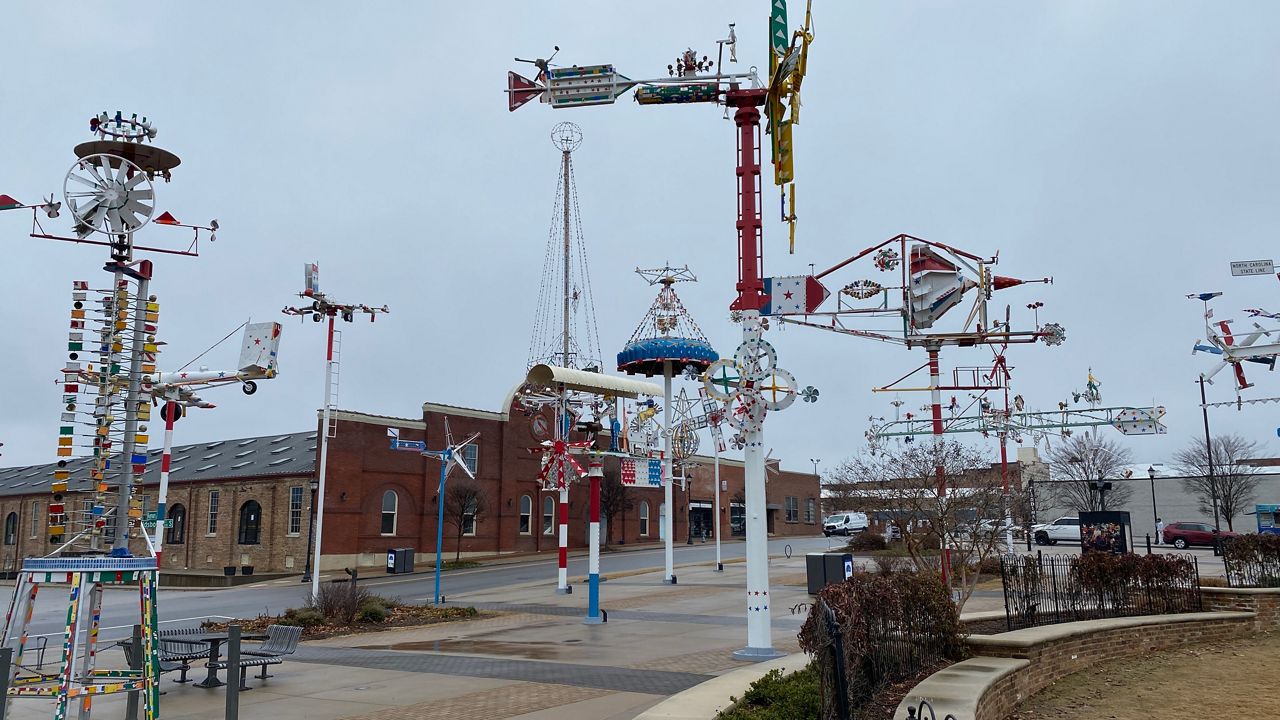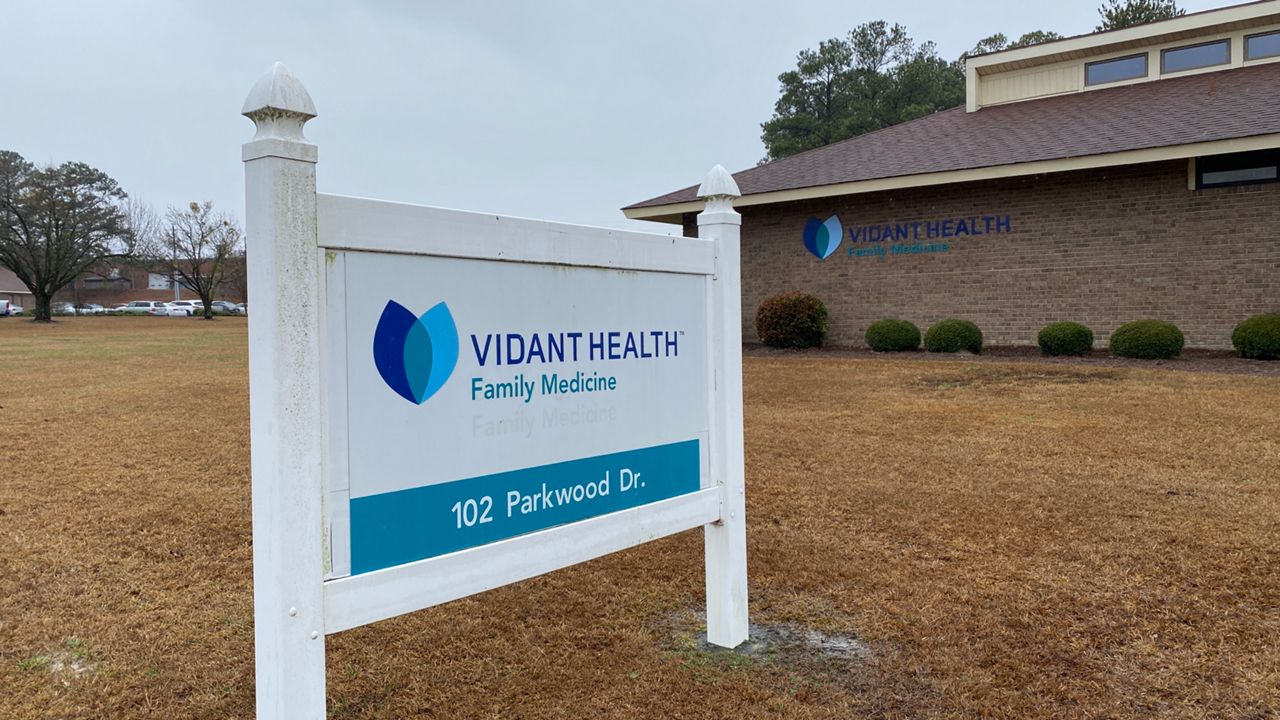SNOW HILL, N.C. — Realo Discount Drug was doing brisk business Thursday morning, with customers lining up to pick up prescriptions. Neighbors talk as they wait in line. This is one of the two drug stores in Snow Hill, North Carolina, a small town in eastern North Carolina surrounded by farmland.
Next door is East Carolina University’s Vidant Health Family Medicine clinic. It’s one of just a handful of health clinics in Greene County, and the university health system plans to shut it down soon.
ECU said its rural health system lost $46 million last year. The hospital system said it is also closing four other rural health clinics: a women’s care clinic in Williamston, an urgent care in Wilson, and family medicine clinics in Jacksonville and Aurora.
In a statement, ECU said the clinics’ closing is “primarily driven by financial pressures including a disproportionate number of uninsured or underinsured patients as well as labor costs for travel staff.”
The population of Snow Hill is about 1,500, and surrounding Greene County has a little more than 20,000 residents. The average wage here is about $36,700, according to the North Carolina Department of Commerce.
The state lists Greene County as Tier 1, meaning economically distressed. Four out of five of the counties where ECU is closing clinics are Tier 1, with the exception of Beaufort County, which is Tier 2.
“These decisions were made following a detailed review of patient census, nearby availability of similar services and staffing realities. Importantly, the health system will work closely with patients to transition care to nearby locations,” ECU said in a statement announcing the closures.
The hospital system did not mince words when it came to the politics involved.
“ECU Health continues to be vocal in its advocacy for funding programs such as Medicaid Expansion and the Healthcare Access and Stabilization Program (HASP) as well as other state and federal resources that are part of the solution to stabilize health care in rural communities,” the university said.
“While ECU Health is cautiously optimistic one or both of these programs may come to fruition later this year, the health system must continue to evolve and optimize operations to ensure it is able to meet its mission now and into the future. This includes making difficult, yet necessary, operational decisions,” ECU said.
Maggie Sauer, the director of rural health for the North Carolina Department of Health and Human Services, agrees with ECU on the question of expanding Medicaid.

“We need Medicaid expansion in the state,” she said. North Carolina is one of 11 states that have not expanded the public health insurance option. Congress approved allowing states to offer Medicaid to more people in the Affordable Care Act, also known as Obamacare, almost a decade ago.
Last year, the Republican controlled legislature came as close as it ever has to passing Medicaid expansion after the state’s top GOP leaders changed course and decided to support the program. Medicaid expansion is expected to be back at the General Assembly this year.
“The reality is, unless you have a way to pay for it, it makes it really difficult,” Sauer said. It’s hard to have a medical clinic if your patients can’t pay for the services.
Primary care like they offer at the clinic in Snow Hill helps keep people out of the hospital, which is much more expensive. It also helps people get treatment for chronic issues and has been proven to both increase quality of life for people and reduce medical costs for patients and hospital systems.
In rural areas like Greene County and other communities around North Carolina, there are compounding issues with getting to a doctor, Sauer said. If a doctor’s appointment is an hour away, that time can be compounded by having an hourly wage job, having to take care of an aging parent, or a lack of child care.
There are similar problems attracting doctors and nurses to rural areas, she said. There’s a shortage of nurses nationally and a rural clinic may not be able to offer the same pay or the same quality of life.
During the height of the COVID-19 pandemic, the federal government pumped money into hospitals and health clinics around the country. That helped keep clinics like the ones in Snow Hill or Williamston afloat, Sauer said.
“The federal government kicked in lots of CARES money to keep these places open and pay for all these new masks and gloves and plexiglass shields,” said Mark Holmes, a professor at the University of North Carolina’s Gillings School of Public Health. His work focuses on rural health care.
“That helped keep them open these last two-and-a-half years and was really vital to keeping the health care system operating as it has,” he said. But that money has mostly dried up now.
“Hospitals are now going back to the financial model where they were in 2019,” he said. “In 2019 and early 2020, we were seeing a pace of rural hospital closures across the country unlike we had seen in the 15 years we’ve been tracking.”
“Eastern North Carolina faces a number of challenges. We know that the poverty rate is higher there, there’s a higher uninsured rate. That makes it difficult to have an ongoing operation,” he said. “The need is high and the resources are limited in the eastern part of the state.”
“We’ve known for years that if you compare eastern North Carolina to any other states in the nation it’s 48th, 49th, and sometimes 50th, looking at health care outcomes, preventable admissions, for example,” Holmes said.
“We’re concerned, like many others, that that rate of closures will continue,” he said.
Health care is tied to economic development, Holmes said.
“If I’m a manufacturing plant, I’m going to want to know that there’s a health care system close by to take care of my employees,” he said. “If I’m a school system and I’m trying to recruit teachers, for example, they’re going to want to know what’s the health care situation like in the community.”
The health care industry itself can be an economic engine for more rural communities. Hospitals like the ones in Greenville, Wilson and Edenton are major employers.
“We know that hospitals are usually one of the largest two employers in a rural community, right up there with the school system. So the symbiance between hospitals and health care more generally, and economic development is critical,” Holmes said.
But you still have to have patients who can pay for treatment. Holmes said his research shows Medicaid expansion can help slow the rate of rural hospital and clinic closures.
“States that have had Medicaid expansion, particularly outside the South, the rate of hospital closures is lower,” he said. “It makes common sense, if you have Medicaid expansion, you have more paying customers.”
One of the sites ECU is closing is a women’s clinic in Williamston. The Martin County town, with a population of about 5,500, sits along the Roanoke River. It’s a small agricultural town on Highway 64, one many people pass through on the way to the Outer Banks.
There’s a small 50-bed hospital there. The doctors and nurses at the women’s clinic in Williamston will transfer to ECU’s women’s clinic in Washington, about 30 minutes down the road.
Health care in some of the state's easternmost counties is something Ann Keyes thinks a lot about. She’s a Washington County commissioner and worked for the county for 45 years, retiring as the county’s emergency management director. She also sits on the board of the Martin-Tyrrell-Washington Health District, a three-county public health authority.
“I was concerned,” she said of hearing ECU would close its women’s clinic in Williamston. “Monetary issues are a major concern.”
But Keyes is nothing if not upbeat about the future of the area.
“Coming from a small rural area, you have to pull all your resources together,” she said. “You may not have robust medical facilities, but what you do have is a group of people who will work overtime to make sure people get what they need.”
“As my mother used to say, ‘a half a loaf is better than no loaf at all,'” she said.
The three counties work together to pool resources. There’s a public van service that can pick people up for doctor’s appointments, and when that’s not available, churches will use their vans to get people to medical appointments, she said.
Those trips for doctor’s appointments could get longer when these five ECU clinics shut their doors. But the economic pressure on clinics is not going away, in eastern North Carolina and the rest of rural America.
That doesn’t deter Keyes, who will continue her work on the health district board and the county commission.
“We are mighty proud of our little county,” she said.



